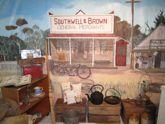Rediscovering Ginninderra:
Eliza Southwell (nee Cooke)
Born: 1810; Died: 1852; Married: Thomas Southwell
In a corner of the church grounds of St John's Church in Reid is a special grave, that of Eliza Southwell, my great-great-grandmother. The grounds are tended, the trees well established, but at the time of this burial the landscape was quite different. The church was newly built, surrounded by cleared land, with some clumps of trees and an occasional building. Eliza was laid to rest here on 20 May 1852, after the birth of her ninth child Jabez, who was buried near his mother four months later. The headstone we see today had been brought from Sydney on Thomas Southwell's wagon.
Historical records tell much about our ancestor, Thomas Southwell. There is a wealth of information about this pioneer settler. But what of Eliza Southwell? Who was this mother of nine, ancestor of hundreds of Southwells? There are few facts and no known photos. Eliza Cooke was born in 1810 in the East Sussex Parish of Salehurst, in the village of Ewhurst. She was married at twenty three to Thomas Southwell at St James Church, Ewhurst Green (near Bodian Castle) in East Sussex. Nearby St Mary's Church at Salehurst stands in its ancient graveyard, on a quiet road which leads to the larger village of Robertsbridge, a typical East Sussex town.
The 1830s brought great hardship for people living in the Parish of Salehurst. Even so, the decision to leave cannot have been easy. Australia, relatively unknown at that time, was almost as far from England as it is possible to travel: literally, the other side of the world. Eliza and Thomas left knowing they probably wouldn't again see their parents, extended family or friends. They embarked on a perilous voyage to an unknown future in an unknown country. The Lady Nugent made the voyage to Sydney in four months.
The company of other emigrants from Salehurst Parish may have made the voyage more bearable. With them on the voyage were Eliza's brother, Thomas Cooke and his family, and the Bainbridge (Bembrick) family. On arrival in Australia Eliza would have had the company of other women from her home area who had settled in Cobbitty. The Wesleyan faith of these East Sussex families was central to their lives, with home and open-air meetings and eventually the establishment of the chapel at Cawdor.
It must have been tempting to remain in a settled area in the company of like-minded Christian friends, but after little more than a year at Cobbitty, Eliza and Thomas again faced a journey into the unknown. Travellers were in danger of being attacked by bushrangers and escaped convicts on Razorback and further south in the Bargo Brush. Many were menaced and injured along the grandly named Great South Road. The trip to the Limestone Plains would have taken weeks in the most trying of conditions along rutted, boggy tracks.
Little is known of Thomas and Eliza's first Ginninderra home at Palmerville. It was possibly of stringybark with an earthen floor. The nearest town was Queanbeyan which in 1841 consisted of 72 residents. Palmerville and the adjacent Charnwood had a population of 100, many of whom were male convicts or ticket of leave men. There were few women.... Ginninderra Creek in the early 1840s was said by Julia Webb, who ran a sly grog shop, to have been "a perfect hell before Thomas Southwell came to live here".
Eliza was often alone with the children for six weeks at a time when Thomas began his teamster operation to and from Sydney. In those early days Eliza would have had to rely upon bush remedies for the children's ailments. She had to provide for the practical needs of the children, for their health, safety and education, a huge undertaking in such an isolated area. For Eliza's own medical support there would only have been perhaps a midwife. In 1852 Eliza died in giving birth to Jabez, her ninth child. She was only 42. Who was Eliza Southwell? We still do not know, but certain qualities come to mind: courage, determination and spiritual strength. It is because of Eliza Southwell that many of us are here today. Eliza Southwell, brave lady, we remember you.
[From 'Stories from Parkwood', written by Dorothy Ebeling. Kindly provided by the Southwell Family Society]
Related Photos
References
- Southwell Family Society, Stories from Parkwood and beyond. The Southwell family, Canberra, 2013.



